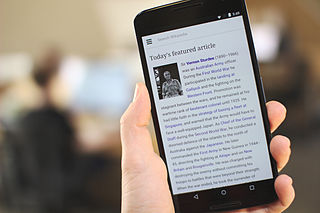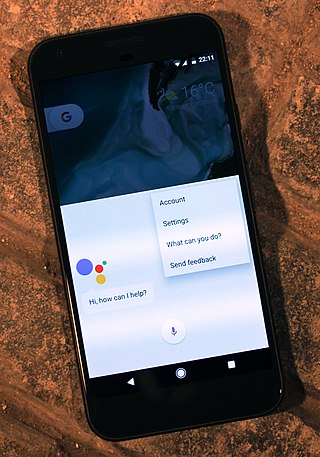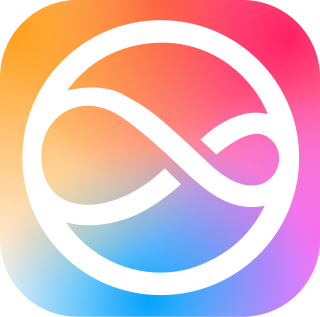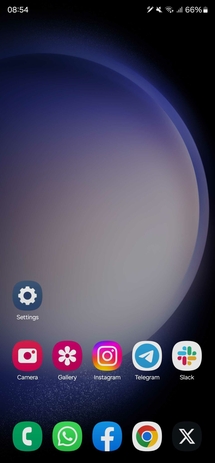
A smartphone is a mobile device that combines the functionality of a traditional mobile phone with advanced computing capabilities. It typically has a touchscreen interface, allowing users to access a wide range of applications and services, such as web browsing, email, and social media, as well as multimedia playback and streaming. Smartphones have built-in cameras, GPS navigation, and support for various communication methods, including voice calls, text messaging, and internet-based messaging apps.

A camera phone is a mobile phone that is able to capture photographs and often record video using one or more built-in digital cameras. It can also send the resulting image wirelessly and conveniently. The first commercial phone with a color camera was the Kyocera Visual Phone VP-210, released in Japan in May 1999. While cameras in mobile phones used to be supplementary, they have been a major selling point of mobile phones since the 2010s.
A voice-user interface (VUI) enables spoken human interaction with computers, using speech recognition to understand spoken commands and answer questions, and typically text to speech to play a reply. A voice command device is a device controlled with a voice user interface.
Android is a mobile operating system based on a modified version of the Linux kernel and other open-source software, designed primarily for touchscreen-based mobile devices such as smartphones and tablets. Android has historically been developed by a consortium of developers known as the Open Handset Alliance, but its most widely used version is primarily developed by Google. First released in 2008, Android is the world's most widely used operating system; the latest version, released on October 15, 2024, is Android 15.

A virtual assistant (VA) is a software agent that can perform a range of tasks or services for a user based on user input such as commands or questions, including verbal ones. Such technologies often incorporate chatbot capabilities to streamline task execution. The interaction may be via text, graphical interface, or voice - as some virtual assistants are able to interpret human speech and respond via synthesized voices.
Swype was a virtual keyboard for touchscreen smartphones and tablets originally developed by Swype Inc., founded in 2002, where the user enters words by sliding a finger or stylus from the first letter of a word to its last letter, lifting only between words. It uses error-correction algorithms and a language model to guess the intended word. It also includes a predictive text system, handwriting and speech recognition support. Swype was first commercially available on the Samsung Omnia II running Windows Mobile, and was originally pre-loaded on specific devices.

Siri is a digital assistant purchased, developed, and popularized by Apple Inc., which is included in the iOS, iPadOS, watchOS, macOS, tvOS, audioOS, and visionOS operating systems. It uses voice queries, gesture based control, focus-tracking and a natural-language user interface to answer questions, make recommendations, and perform actions by delegating requests to a set of Internet services. With continued use, it adapts to users' individual language usages, searches, and preferences, returning individualized results.
The Galaxy Store is an app store offering apps, games and exclusive themes and other customizations for mobile devices manufactured by Samsung Electronics. The service is primarily supplied pre-installed on Samsung Galaxy smartphones and tablets, and Galaxy Watch wearables. It requires a Samsung account to be used.

The Samsung Galaxy S III is an Android smartphone developed and marketed by Samsung Electronics. Launched in 2012, it had sold more than 80 million units overall, making it the most sold phone in the S series. It is the third smartphone in the Samsung Galaxy S series.

Samsung Galaxy Ace 2 (GT-I8160) is a smartphone manufactured by Samsung that runs the Android operating system. Announced and released by Samsung in February 2012, the Galaxy Ace 2 is the successor to the Galaxy Ace Plus.

The Samsung Galaxy S4 is an Android smartphone produced by Samsung Electronics as the fourth smartphone of the Samsung Galaxy S series and was first shown publicly on March 14, 2013, at Samsung Mobile Unpacked in New York City. It is the successor to the Galaxy S III, which maintains a similar design, but with upgraded hardware, more sensors, and an increased focus on software features that take advantage of its hardware capabilities—such as the ability to detect when a finger is hovered over the screen, and expanded eye tracking functionality, it was released the previous year. A hardware variant of the S4 became the first smartphone to support the emerging LTE Advanced mobile network standard. The T-Mobile version of the Galaxy S4, named the model (SGH-M919), was released the same month. The phone's successor, the Samsung Galaxy S5, was released the next year.
A lock screen is a computer user interface element used by various operating systems. They regulate immediate access to a device by requiring the user to perform a certain action in order to receive access, such as entering a password, using a certain button combination, or performing a certain gesture using a device's touchscreen. There are various authentication methods to get past the lock screen, with the most popular and common ones being personal identification numbers (PINs), the Android pattern lock, and biometrics.
The Samsung Galaxy Express (GT-I8730) is a smartphone made by Samsung which was launched in March 2013 in India featuring a similar design to the Galaxy S Duos but with additional features such as 4G LTE, NFC. It also features a bigger 4.5-inch screen with Super AMOLED Plus and retains all the features which the Samsung Galaxy S III phone has.

The Samsung Galaxy Star is a low-end smartphone manufactured by Samsung Electronics. It was announced in April 2013, it was subsequently released in May 2013. It is the cheapest smartphone in the Samsung Galaxy series. Like all other Samsung Galaxy smartphones, the Galaxy Star runs on the Android mobile operating system. The phone is available in 2 versions: a single SIM version (GT-S5280) and a dual SIM version (GT-S5282). The phone competes with other low-cost smartphones such as the smartphones from the Nokia Asha series as well as low-cost smartphones manufactured by Indian manufacturers such as Micromax, Karbonn, Spice Digital, Lava International and Celkon. It is available in certain Asian countries such as India, Pakistan, Sri Lanka, Nepal, Bangladesh, Myanmar, Philippines, Indonesia etc. where low-cost smartphones are very popular as well as in Morocco, Algeria, South Africa, Portugal, France, Germany, Russia and Ukraine.
The Samsung Galaxy Express 2 (SM-G3815) is a smartphone made by Samsung which was launched in October 2013 featuring a similar design and specifications of the Samsung Galaxy S4 Mini but with a bigger 4.5 inch screen and different cameras.
Michael Phillips is the CEO and co-founder of Sense Labs and a pioneer in machine learning, including mobile speech recognition and text-to-speech technology.

The Samsung Galaxy Note 8 is an Android-based smartphone phablet developed, produced and marketed by Samsung Electronics. The successor to the discontinued Samsung Galaxy Note 7, Samsung Galaxy Note Fan Edition and Samsung Galaxy Note 5, it was unveiled on 23 August 2017 and became available on 15 September 2017.

One UI is a user interface (UI) developed by Samsung Electronics for its smart devices, including Android devices running Android 9 (Pie) and later. Succeeding Samsung Experience, it is designed to make using larger smartphones easier and be more visually appealing. It was announced & unveiled at Samsung Developer Conference in 2018, and was updated in Galaxy Unpacked in February 2019 alongside the Galaxy S10 series, Galaxy Buds and the Galaxy Fold.

A foldable smartphone is a smartphone with a folding form factor. It is reminiscent of the clamshell design of many earlier feature phones. Some variants of the concept use multiple touchscreen panels on a hinge, while other designs utilise a flexible display. Concepts of such devices date back as early as Nokia's "Morph" concept in 2008, and a concept presented by Samsung Electronics in 2013, while the first commercially available folding smartphones with OLED displays began to emerge in November 2018.

Google Messages is a text messaging software application developed by Google for its Android and Wear OS mobile operating systems. It is also available as a web app.










